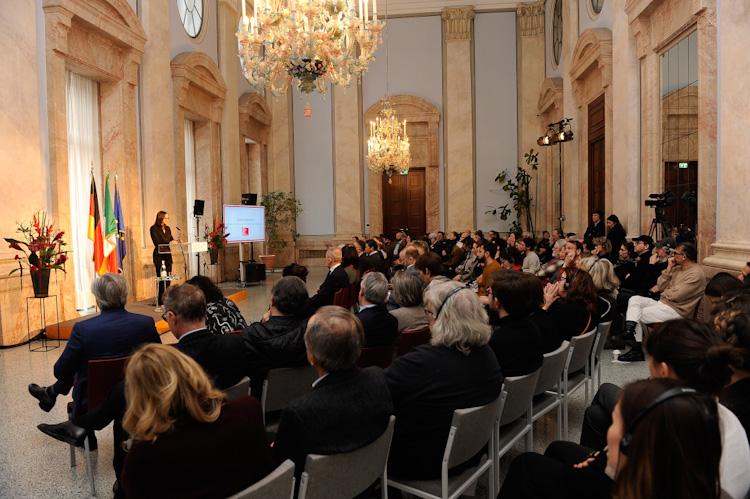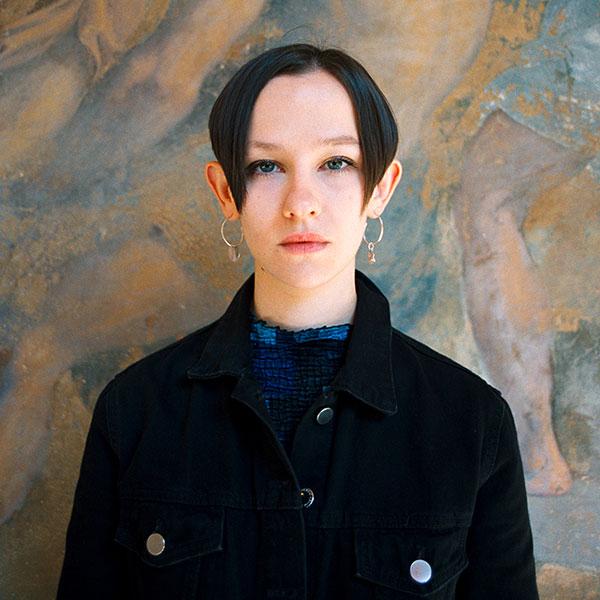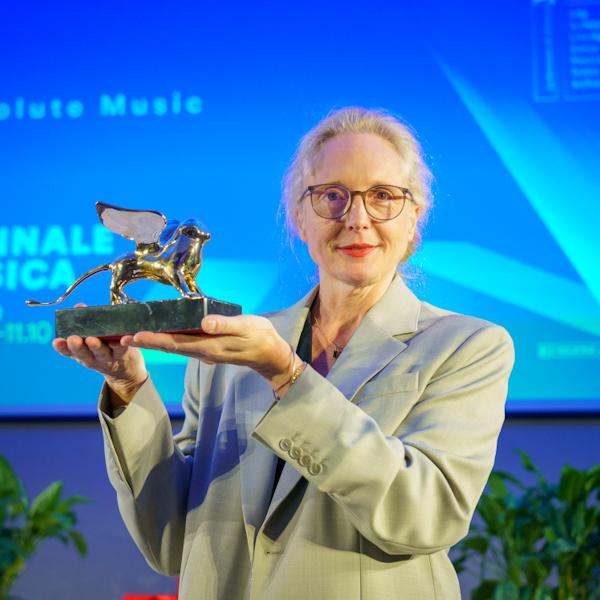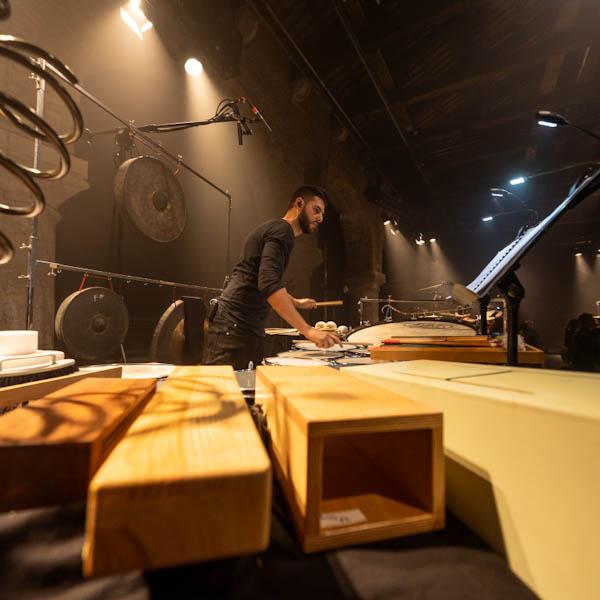
Biennale Musica 2025: special preview in Berlin
The 69th International Festival of Contemporary Music will run from 11-25 October, directed by Caterina Barbieri. Biennale College Musica: call for applications announced.
La Biennale di Venezia 2025
A press conference was held today, Thursday February 13th in Berlin, at the Italian Embassy in Germany, to present La Biennale di Venezia for 2025 – exhibitions, festivals, special projects – with a focus on music and a preview announcement of some of the projects for the 69th International Festival of Contemporary Music (11 > 25 October). The press conference was attended by Fabrizio Bucci, the Italian Ambassador in Germany, Pietrangelo Buttafuoco, President of La Biennale di Venezia, and Caterina Barbieri, the new Artistic Director of the Music Department.
The complete programme of the 69th International Festival of Contemporary Music (11 > 25 October) will be announced in a dedicated press conference on March 27th in Venice.
69th International Festival of Contemporary Music
The Star Within is the title of the 69th International Festival of Contemporary Music to be held in Venice from 11 to 25 October. A poetic-symbolic image suggested by the words of the Brazilian author Clarice Lispector – If the twinkling of the stars pains me, if this distant communication is possible, it is because something almost like a star quivers within me.
Caterina Barbieri writes: “Music is the star within. It is the desire for great things and for vastness. Spark of new worlds, it opens us to infinity. A vibration that permeates the cosmos and pierces through us with awe, from molecule to planetary motion, sound escapes the boundaries of the ego and opens us up to the encounter with the Other — the unknown. In this resonance, there is deep listening, which is itself the primary root of empathy. In sound the interconnectedness animating all living things is laid bare. As an exercise in transcendence, music can help us overcome anthropocentric ways of thinking and experiment with more ecological ways of living together that respect the complex constellations of human and non-human forces that traverse our universe”.
“The festival aims to explore the theme of cosmic music. Generative music — genesis of worlds, cosmogony. Music as a living organism, as an autopoietic form able to self-evolve and develop its own laws — a metaphor for the cosmos. Music that mirrors and manifests nature in its becoming, making perceptible its processes of creation and transmutation. Music that teaches how to be in the present moment: past and future collapsing in the ‘now’. In deep listening, we feel interconnected and in continuous transformation: inner resonance with the universe. In this resonance, music responds to ancient and modern man's need to dialogue with something greater than himself, which transcends individual existence and brings him closer to the dimension of the unknowable. An intimate dialogue that transforms the individual and the collective, nurturing a sense of community and creating opportunities for catharsis and social cohesion. Music is an agent of change”.
“Cosmic music is not a genre or a style. Through using this poetic expression, I am not referring to a specific musical style or tradition but rather to the generative power of music to create new worlds, beyond rigid definitions of genre or historical affiliations.
In curating the Biennale Musica I would like to have the most vivid and fluid possible view of the contemporary to represent the full richness and diversity of the music of the present. I would like to celebrate the permeability of the musical language and its innate capacity to mutate. In the ecstasy of listening, rigid notions of time and space dissolve: music teaches us much about the relativity and limits of human perception. In this it is similar to Venice and its vocation to mutability: the play of reflections, the vanishing perspectives, the perpetual motion of water and light that dissolve boundaries and open to the space of the multiple and the infinite.
Fixed thinking becomes obsolete and opens us to change. As a curator I would like to give voice to this change, nurturing an idea of music as a portal into the future and imagining the impossible”.
The projects
The artists, musicians, performers and composers who with their projects will build the constellation of the 69th International Festival of Contemporary Music will feature:
LAURIE SPIEGEL – Biennale Musica presents the European premiere of The Expanding Universe, the seminal piece by Laurie Spiegel that explores the relationship between sound and cosmogony, reinterpreted by the Dither Quartet, the electric guitar quartet from New York, known for the versatility with which it interprets experimental repertories that range from composed music to improvisation to electronics.
The Festival thus pays tribute to one of the most influential figures in electronic music, casting new light on a work that continues to reveal its visionary power, inviting us to reflect upon music as a form of knowledge and imagination, a map to navigate the. Mystery of time and matter.
A composer, programmer and pioneer of electronic music, Laurie Spiegel has developed a language of sound that merges mathematics and human sensibility, technology and intuition. Her work, profoundly influenced by cybernetics, by her guitar and ancient lute studies, by folk modal music and African and Indian polyrhythms, considers sound as a living organism that is constantly expanding.
Conceived between 1974 and 1977 at the Bell Laboratories, The Expanding Universe arises from a dialogue between the author and the Groove system, an innovative sound synthesis software. Her sonic experimentation is situated with an aesthetic that refutes determinism and embraces generativity as the fundamental principle of musical creation. The track Kepler’s Harmony of the Worlds was included in the Golden Record that was launched on board the Voyager probe, bearing witness to Spiegel’s ambition to connect music to the vastness of the universe. In addition to her pioneering work with sonic synthesis systems, in 1986 Spiegel developed the Music Mouse – An Intelligent Instrument, a musical composition software for MacIntosh, Amiga and Atari. This programme, which contained an integrated knowledge of the harmonic conventions and scales, automated the processes of composition, allowing the user to concentrate on other aspects of the music in real time.
CHUQUIMAMANI-CONDORI – A musical procession on the Venice waterways will be the opening event of the Festival, to celebrate and restore the value of sound as a collective ritual.
The multidisciplinary artist and musician Chuquimamani-Condori, also known as Elysia Crampton Chuquimia, will present a project commissioned by Biennale Musica in which they will make the “water ceremonies” of the past and the present resound. A musical procession of small boats will glide down the canals of Venice and culminate in a live concert by Los Thuthanaka, the duo of Chuquimamani-Condori and their brother Joshua Chuquimia Crampton, in front of the basin of the Gaggiandre at the Arsenale.
Resonating with the words of the Aymaran Pakajaqi artist who recently described their experimental album DJ E as “the sound of our water ceremonies, the 40 bands playing their melodies at once to recreate the cacophony of the first aurora and the scream of our star, Chuqi Chinchay”, this is one of the special projects of Biennale Musica to connect with the social fabric of the city, starting with the local sonic culture of the lagoon and projecting it into a context of reimagination and syncretism.
Like a living organism, the musical composition will come to life through the choreographed movement of the boats, building a constellation in which Chuquimamani-Condori’s sounds are woven in an abrasive symbiosis between the ancient and the contemporary that redefines the themes of connection, love & devotion.
WILLIAM BASINSKI – Another commission by Biennale Musica that engages with the presence of water is the new monumental work by the avant-garde American composer William Basinski, who reimagines the tape loops of Garden of Brokeness for a number of grand pianos, percussions, and vaporetto motors which premieres in Venice. The sonic architect of melancholy and the ephemeral through the stratified use of tape loops, as in the now iconic series Disintegration Loops, presented at the 2008 Biennale Musica and the object of various orchestral transcriptions, Basinski develops this new work as a multidimensional meditation on time, memory and the continued resonance of the past in the present.
GRAINDELAVOIX – The vocal ensemble led by Björn Schmelzer, who founded it in 1999 in Antwerp, with Epitaphs of Afterwardness brings its transformative approach to ancient music to the Festival, dissolving the boundaries between historical performance and contemporary sonic experimentation. Renowned for their raw, expressive sound and deep engagement with the intimate materiality of the voice, Graindelavoix reanimates ancient repertories, treating them as living evolving entities rather than as static historical artefacts. For Biennale Musica they will present a programme in which the Messe de Notre Dame by Guillaume de Machaut, an absolute masterpiece of Medieval religious polyphonic music, dialogues with the great revolutionaries of the twentieth century – György Kurtág, György Ligeti, Iannis Xenakis – in a dialectical resonance between different musical eras.
ENRICO MALATESTA – A unique voice in contemporary percussion, Enrico Malatesta explores the physical nature of sound through an approach that is both minimal and radical at the same time. His performances reveal the hidden resonances of simple materials – leather, wood, metal – transforming percussive gestures into intricate sonic microscopies, which explore the relationships between music, space and movement with particular attention to modes of listening. In Venice, the artist will present the world premiere of the composition Solo VI by the German composer and organist Jakob Ullman for percussion and audio reproduction devices. Ullman’s music explores the margins of perception, working with threshold volumes and durations that extend beyond the classical format of a concert, inviting the listener to listen carefully at the interstice between silence and the vibrational response of sound.
At the Biennale Musica Malatesta will also perform Occam Océan – Occam XXVI (2018) by the French pioneer of electronic and drone music Éliane Radigue. This composition, which is part of the acoustic cycle for solo instrumentalists Occam Océan, was written by Radigue especially for Enrico Malatesta and is the result of a close collaboration with the Italian percussionist.
ACTRESS AND SUZANNE CIANI _ Actress and Suzanne Ciani come together at Biennale Musica in an iconic transgenerational musical meeting to present the Italian premiere of their new musical collaboration, Concrète Waves. Though the respective practices of Actress and Suzanne Ciani arise from two distinct generations and artistic backgrounds, both artists share an unrelenting drive to experiment with expressive languages with a richness and singularity that eludes classification in any style category. Their new collaboration merges the organic fluidity of Ciani’s Buchla expressions with the rhythmic eclecticism of Actress’ so-called “R&B Concrète”.
A master of surrealist sound collages, starting with his revolutionary 2010 album Splazsh, Actress is a relentless innovator of the languages of dance music, and has received invitations from the major cultural institutions such as the Tate Modern, British Arts Council and London Contemporary Orchestra.
An absolute pioneer of electronic music, the American composer and pianist, the “Diva of the Diode”, Suzanne Ciani is known for her iconic works with the legendary Buchla synthesizer and her success as a sound designer in the American television industry, which have spanned her fifty-year career and brought her five nominations for a Grammy award.
MORITZ VON OSWALD – One of the most venerated architects of electronic and experimental music, Moritz von Oswald presents the Italian premiere of his composition Silencio. This project, a collaboration with a 16-voice choir, delves into the nuanced interaction between the human voice and analogical synthesis. Silencio challenges and expands the boundaries of electronic music and the traditions of choral music, intertwining the organic with the electronic in masterful ways.
Considered the trailblazer of the Detroit-Chicago-Berlin axis with the foundation of the legendary German label Basic Channel in the 1990s, the classical percussionist, composer, multi-instrumentalist and sound engineer Moritz Von Oswald has had a decisive influence on the development of experimental electronic music for his minimal techno with overtones of dub and reggae as well as for the versatility of his production, which embraces a wide range of musical influences. One example in this sense in his electronic reinterpretation of pieces by Ravel and Mussorgsky in Re-Composed, an album recorded with Carl Craig for Deutsche Grammophon, the prestigious classical music label.
CHRISTIAN FENNESZ – A pioneering figure in glitch music, Christian Fennesz will present an expanded version conceived especially for Biennale Musica of his seminal work Venice, an absolute manifesto with the unmistakable signature sound of the Viennese guitarist and electronic musician.
Originally recorded in the lagoon city in 2004, Venice was recently reissued by Touch Music in an expanded version to celebrate the twentieth anniversary of this masterpiece of sonic and emotive abstraction, in which an acoustic and an electric guitar, synthesizers, samplers and field recordings gathered in Venice coexist in a sublime tension between beauty and decadence. In the words of the artist, Venice is “a suggestive description of a dignified decline, decay, death, and rebirth”, a perfect encapsulation of the changing and ephemeral nature of the city on water, of which Transit, the album track on which he collaborated with David Sylvian, seems to be the expression with the greatest emotional intensity. An artist whose sound is difficult to classify, Fennesz stands at the origin of the glitch influence, the conceptual form of electronic music that considers error and disfunctionality as a way to sound out the hidden side of music, before evolving towards more dilated forms of pop, ambient and noise, of which Venice is a particularly emblematic sonic poem. The breadth of his research has led to collaborations with many leading musicians, from David Sylvian to Ryuichi Sakamoto, leading to the Sala Santa Cecilia Ep, to Mika Vainio and Christian Zànesi, artistic director of the GRM in Paris, which led to the modern digital vision of concrete music by the GRM Experience.
DEFORREST BROWN JR. – A theorist, musician and cultural critic, DeForrest Brown Jr. presents the Italian premiere of the electronic project Speaker Music, a pulsating and high-velocity exploration of rhythm, improvisation and sonic futurism that channels the African American modernist tradition of rhythm and soul music as an intellectual site and sound of techno-vernacular expression. Rooted in the traditions of black music, Brown takes on live performance as a self-perpetuating organic system, in which polyrhythmic structures, processed samples of brass and sharp synths are stratified in an experimental territory between techno, free jazz and computer music.
In his book Assembling a Black Counter Culture (2022), DeForrest Brown Jr. has become the absolute reference point for international critical theory on the Afro-American roots of techno, which reinterprets this musical tradition as a cultural product originating in Detroit and a vernacular expression specific to the black community.
With the multidisciplinary nature of his practice, DeForrest Brown Jr. traces parallels between Afro-Futurist experimentalism, techno and other Black-rooted electronic music innovation, connecting his research to the themes of diaspora, generational trauma and speculative futurism, where the music is viewed as a means through which to imagine possible new futures.
CARL CRAIG – A key figure of second-wave techno wave in Detroit, where he was born and raised and still lives today, Carl Craig brings his visionary sound to the festival with a DJ set that embodies the city’s rich legacy of Afrofuturism and sonic innovation. One of the leading architects of the diffusion and development of techno music across the globe, with foundational albums such as Landcruising (1995) and More Songs About Food and Revolutionary Art (1997), Craig has always pushed the boundaries of this music, blending the mechanical impetus of technology with the organic fluidity of jazz improvisation. His sets are a journey through the many possibilities of techno in dialogue with a cosmological perspective of sound always projected towards the future, bearing witness to the musical and cultural power of gender.
His label Planet E Communications, inspired both by the electronic tradition of Detroit and his interstellar vision of Afrofuturism, has developed an avant-garde aesthetic that draws on rhythmic impulses, sidereal harmonies and stratifications of futuristic synth, constructing journeys through sound in which the dance floor becomes a place of perceptive expansion.
FONTANAMIX ENSEMBLE – Aligned with the theme of the festival that explores music as a generative principle and form of cosmogony, the FontanaMIX Ensemble proposes a repertory that fosters a dialogue between two figures who come from different historical and geographical contexts but share a focused research into the metaphysical nature of the cosmic dimension of sound: Giacinto Scelsi, the visionary Italian composer who celebrates the 125th anniversary of his birth this year and Vahid Hosseini, a composer born in Tehran in 1984, whose training embraces both Persian music and western experimentations.
Two authors, both of whom have been explored by the contemporary ensemble from Bologna, and who are widely separated in terms of history and generation, but whose paradox of exploring sound by bringing together distant worlds becomes the stimulus for them both for a profound meditation on the meaning of music and deep listening.
Scelsi, fascinated by the East and its esotericism, has profoundly influenced the French musicians known as “Spectralists”. Through his radical investigations into timbre that anticipate the minimalist aesthetic and drone, he has opened new avenues for listening in which music is experienced as an art that can hone perception and a new path to an understanding of the universe.
Hosseini, aligned with this thinking, brings his own experience as a composer trained in Iran, Italy, Finland and Germany. His composition explores the intersections between Persian music and the European avant-garde, placing sound at the centre of a reflection that involves the perceptive dimension of listening.
This musical journey weaves together East and West, past and present, exploring sound not only as a physical and acoustic phenomenon, but as a vehicle for a cognitive and transformative experience, that interrogates our relationship with time, space and sonic material.
MAXIME DENUC – Born in France and based in Brussels, Maxime Denuc merges the expressive richness and emotional power of the church organ with a contemporary electronic music sensibility, suspended between the euphoria of trance and techno music and the geometries of Baroque polyphonic music, in a synthesis that is poetically expressed in his latest album Nachtorn for midi-controlled organ.
At Biennale Musica, Maxime Denuc will present the Italian premiere of Elevations, an installation, made in collaboration with the Belgian artist Kris Verdonck, that incorporates the inspiration of the dub techno aesthetic into the fragile ephemeral sound of an organ controlled by computer via midi specifically created by the artist with organ-maker Tony Decap. Incorporating elements of harmonic repetition, cyclicity and subtle variations of the motifs typical of dub techno, Elevations draws inspiration from the melancholic post-rave atmosphere that lingers at the end of a party, when bodies relax and night transitions into day. Scheduled throughout the duration of the Festival, Elevations captures this moment of emotional and perceptive liminality, in an immersive sound and light installation that explores concepts of fluid time, caducity and altered states of perception.
SUNN O))) – Sunn O))) are the cult drone metal duo whose monolithic sound conjures a sense of the transcendent and transformative power of distortion, resonance and volume. Working together for over two decades, the duo of Stephen O’Malley and Greg Anderson has redefined the possibilities of heavy music, dissolving the boundaries between metal, ambient, and experimental composition. Their performance, which is also a kind of immersive ritual, arrives to Venice for the first time as part of the Biennale Musica 2025.
Biennale College Musica 2025:
the new call for applications
Biennale College is the programme that La Biennale di Venezia, and all its Departments, promotes to support young artists, selected through international calls, for theoretical-practical residencies the aim of which is to create original works engaging with mentors and teams of experts. In alignment with the theme of the Festival, which explores the idea of music as a form of cosmogony, the call for Biennale College Musica 2025 aims to select 5 musical projects – live performances or acousmatic compositions diffused through multiple channels.
The focus of the call is on the possibilities offered by electronic and electroacoustic music to expand the potential of acoustic instrumentation and develop independent compositional and performative instruments to build complex musical universes that explore the generative nature of music.
The programme of residency, research, creation and production that will take place in Venice across three sessions to be held from May to October, using the spaces of Arsenale and in particular the CIMM studios (Centro di Informatica Musicale e Multimediale of La Biennale di Venezia) will have as its final outcome the premiere of 5 original works by the selected musicians at the 69th International Festival of Contemporary Music.
The mentors selected for the College, who come from different fields of artistic and theoretical research in contemporary music (from the field of academic research to performance practice, from audiovisual multimedia research to club culture, from electroacoustic music to sound design), will include: Lorenzo Senni, DeForrest Brown Jr., Marcel Weber (MFO), Thierry Coduys.
Starting today, February 13th, the call for applications is available on the website of La Biennale di Venezia through March 13th.




